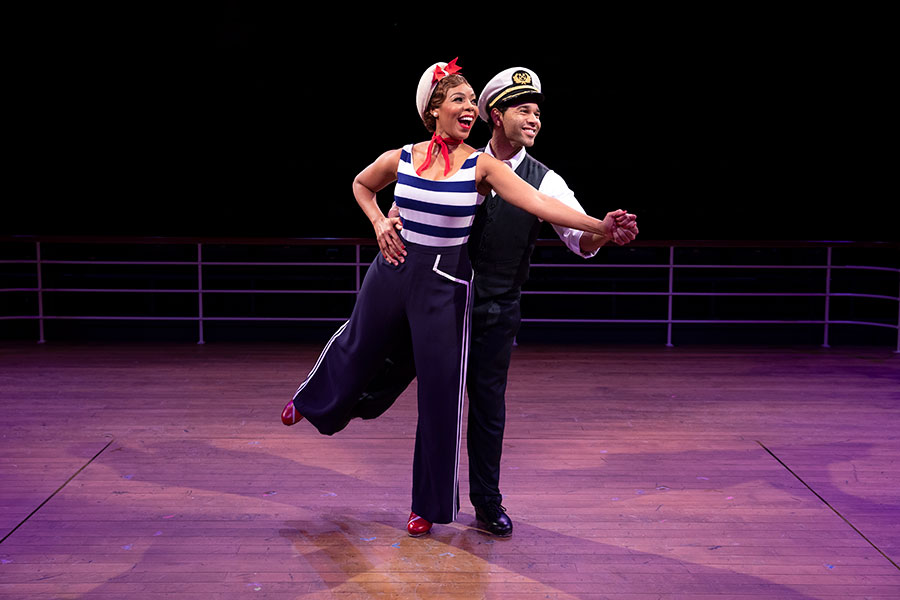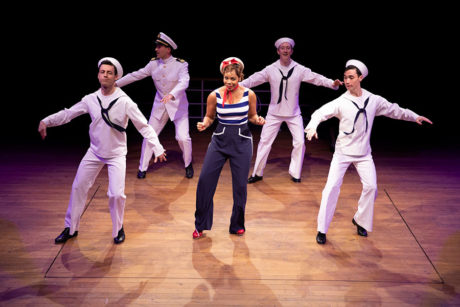“De-Lovely” doesn’t even begin to cover it. Arena Stage’s production of Anything Goes is as close to musical theater heaven as you can get. Cole Porter’s classic melodies and innuendo-laden lyrics, a cast that sings and dances superbly, and spectacular costuming highlight the latest of director Molly Smith’s renditions of Golden Age musicals.

From her opening number, “I Get a Kick Out of You,” Soara-Joye Ross’s take on evangelist/nightclub singer Reno Sweeney is transformative. Traditionally, Reno, originated by Ethel Merman, is a belt role. Ross gives her songs a more jazz chanteuse flavor, with a dose of vibrato, and a willingness to vary dynamics in places that many interpreters have not. Reno is a diva, in the best sense, and Ross brings the character’s performer chops to the fore in “Blow Gabriel Blow” and the title song that, along with its dynamic all-hands-on-deck tap sequence, got a well-deserved standing ovation at the end of Act 1.
Ross also underlines an often-underappreciated side of Reno’s character, her generosity of spirit and capacity for friendship. Of course, she has a song called “Friendship,” a warmly comic duet with gangster Moonface Martin (Stephen DeRosa)–but more important is her friendship with male lead Billy Crocker (triple threat Corbin Bleu), which can fairly be called the central relationship of the show. Reno and Billy have been “friends forever.” When Billy rebuffs Reno’s pitch to move beyond the friend zone, she responds by doing everything she can to foster his romance with ingénue Hope Harcourt (Lisa Helmi Johanson). Moonface, eager to move up the celebrity pecking order from Public Enemy Number 13, and Billy, who for a time impersonates Public Enemy Number One, cement their friendship during a stay in the brig.
All this takes place on a voyage from New York to London on the liner S.S. American – nicely realized by Ken McDonald’s mobile set design – which serves as a kind of seagoing Forest of Arden in which normal rules are suspended and relationships are re-sorted. As Smith points out in her program note, some of the targets of the satire of the 1934 show (Arena uses a witty 1987 revision of the book by Timothy Crouse and John Weidman), such as the privileges of the very rich and the adoration of celebrities, have parallels today. But the satire is light and rather affectionate; the joy of the show remains in its songs and dances.
Bleu’s singing ranges from tender lyric tenor love lyrics, notably “You are So Easy to Love” and “All Through the Night,” to a lively celebration of his friendship and mutual admiration with Ross, the duet “You’re the Top.” He taps, he moves athletically, he does sweeping partner dancing that would do credit to Gene Kelly, as in his “De-Lovely” scene with Hope. Johansen has a classic ingénue soprano voice, used to good effect in the little-known “Goodbye, Little Dream” as well as her duets with Bleu.
“Women and character actors first,” Moonface proclaims at one point, and the production is full of fine character performances by actors who sing well. In addition to “Friendship,” DeRosa has the thoroughly silly “Be Like the Bluebird,” an ode to incarcerated optimism. His moll, Erma (Maria Rizzo), vamps the sailors with “Buddy Beware.” Lord Evelyn Oakleigh (Jimmy Ray Bennett) – a seemingly stiff upper lip Brit with a talent for mauling any piece of American slang he encounters – unveils his wild side to the quite fascinated Reno in “The Gypsy in Me.” The celebrity-conscious ship’s captain (Jonathan Holmes) and Billy’s Yale-boosting, eight-martini lunch swilling, boss Elisha Whitney (Thomas Adrian Simpson) have striking character moments as well.
The ensemble of sailors and Reno’s “angels” (i.e., backup singers) are perpetual motion dancers who execute Parker Esse’s varied choreography flawlessly and sing well doing it. There’s a particularly nice moment in “Blow Gabriel Blow” where Reno leaves the main playing area for a time, leaving attention centered on the ensemble dancers. They deserve it.
Alejo Vietti’s costumes would do credit to the best of 1930s-’40s Hollywood. Reno appears in one sumptuous, differently colored gown after another, perfectly fitted to how she moves, as well as a natty sailor outfit for the “Anything Goes” number. Hope’s dresses are elegant, using light, flowing material, befitting the wealthy but rather innocent debutante she is. Vietti gives Hope’s gold-digging mother (Lisa Tejero) outfits of the sort Margaret Dumont might wear in a Marx Brothers movie. The “angels” have long white, nearly backless, gowns at first; get sailor-like garb for “Anything Goes;” and start “Blow Gabriel Blow” in sexy choir robes, then making a mid-dance costume change that wowed the audience. The show looks gorgeous, and the costume construction beautifully abets the cast’s movement.

Smith keeps the proceedings visually varied by using not only the main stage – including the hydraulic lift from underneath it to form staterooms and the brig – but also high stairways and platforms on each corner to position actors for certain scenes, including some important vocal solos. She keeps the show moving: even in book scenes, nobody is standing in one place for long, and all sides of the house get equal attention.
Music director Paul Sportelli and his musicians create a rich accompaniment for the singers throughout. There are some thoughtful interpretive moments, such as a surprising and effective quieter moment in the midst of “Blow Gabriel Blow.” The music, sound (Daniel Erdberg), and lighting (Kimberly Purtell), are precisely coordinated with the actors’ movement.
This production belongs on the “must see” list for anyone who enjoys musical theater or, for that matter, anyone looking for entertainment other than routine holiday fare at this time of year.
Running Time: Two hours and 25 minutes, including one intermission.
Anything Goes plays through December 23 at Arena Stage, 1101 6th Street SW, Washington DC. For tickets, call (202) 488-3300 or go online.





You have noted very interesting points! ps decent website.
This show absolutely knocked my socks off. The review captures all of it — the intense professionalism of all involved. Another element is the intimacy of it all. The amazing and joyful choreography is right in front of you. I literally laughed and cried. The silliness was fun, not foolish. The talent on display–singing and dancing–was otherworldly. There were some empty seats. So GO! If you like musicals, or not, this performance has it all and rises to a higher level of pure art.